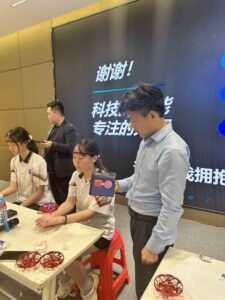
Dr. Gao Junling led a team of Mind & AI recently to a transformational educational experience at the prestigious Guangzhou Foreign Language School. The event, far more than a simple technological demonstration, was a profound philosophical inquiry into the very engine of human progress, challenging students to reconsider the source of their own potential.
Dr. Gao, a neuroscientist and founder of Mind & AI, opened the session with a compelling presentation titled, “The Development of Science and Technology is the Development of Human Civilization.” He posited that humanity’s greatest inventions—from the wheel to the microchip—are not merely external tools but outward manifestations of our inner cognitive evolution. The true frontier of progress, he argued, lies not in the stars, but within the intricate neural pathways of the human brain.
His lecture framed technology not as an external force, but as the ultimate “tool for creating human possibilities,” a means to extend the reach of human intention and compassion. The central pillar of his thesis, however, was the concept of “attention as power.” Dr. Gao compellingly illustrated that in an age of infinite distraction, the ability to focus one’s mind is the most critical and undervalued resource—the fundamental skill upon which all learning, creation, and self-mastery is built.
Following this philosophical foundation, the theory was brought to life in a breathtaking practical demonstration. The Mind & AI team introduced students to a brain-computer interface (BCI) system, where simple electroencephalogram (EEG) headsets translated the electrical symphony of their brain activity into a quantifiable “attention score.”
The atmosphere in the auditorium shifted from intellectual curiosity to electrified wonder as students, one by one, learned to calm their minds and channel their concentration. With their mental energy focused, and before the eyes of their peers, small UFO drones began to tremble, lift, and hover steadily above their open palms. The direct, visible link between the abstract act of focusing and a tangible, physical outcome was undeniable. A hushed silence gave way to gasps of amazement and then to applause, as students realized they were not just watching a demonstration—they were embodying the principle itself.
At the end of the event, students understood that the mastery of attention is the next great leap in human development. By first “knowing thyself”—understanding the mechanics and potential of one’s own mind—and then learning to direct its power with purpose, students can harness technology not as passive consumers, but as conscious architects of a more thoughtful and innovative future.
“The drone is a metaphor, just like focusing a magnifying glass on sunlight” Dr. Gao concluded. “Today, you used your focus to defy gravity for a small toy. Tomorrow, that same disciplined mind will allow you to lift ideas, solutions, and communities. You have within you the most powerful technology ever known. This demonstration was simply a mirror, showing you that power for the first time.”